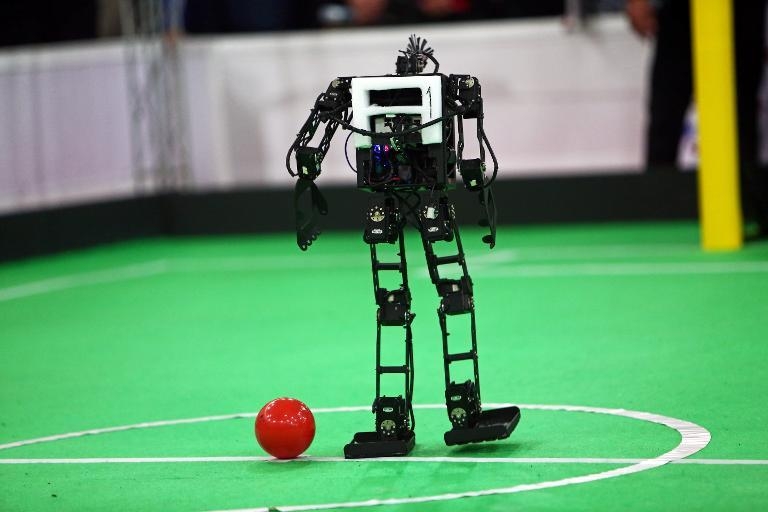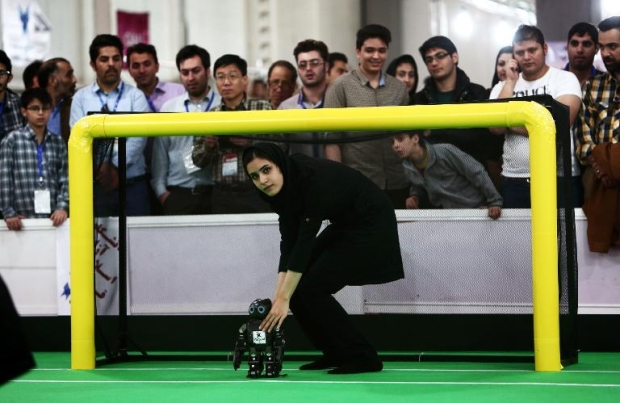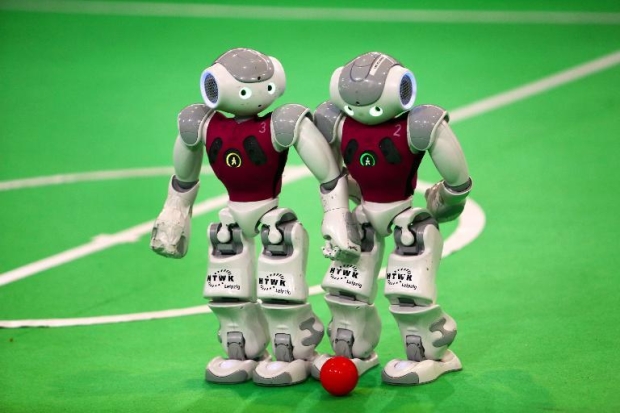Iran triumphs in football's RoboCup

By Cyril Julien
TEHRAN - Iran may be lumbered with economic sanctions but that did not stop a local team of robotics experts from sweeping aside German and Dutch rivals in football's RoboCup.
In an event that could be considered just a fun distraction if it weren't for all the hard work involved, the annual tournament drew an international field of competitors last weekend.
On a green felt carpet, five teams -- three German, one Dutch and the other Iranian -- contested RoboCup's 9th edition in Tehran, with the robots trying to prod a red ball into the back of their opponent's net over two 10-minute halves.
Standing just 60 centimetres (24 inches) tall, the key factor in the match -- unlike in everyday electronic games -- the robots are pre-programmed by their human masters ahead of kick-off.
New MEE newsletter: Jerusalem Dispatch
Sign up to get the latest insights and analysis on Israel-Palestine, alongside Turkey Unpacked and other MEE newsletters
"The robots are completely autonomous -- we don't have any control on the game and they make their own decisions," said Novin Sharhoudi, 20, a student of software and computer engineering at Qasvin Azad University, northwest of Tehran.
And unlike professional sport in which money can buy the best players, the RoboCup teams used identical machines designed by Aldebaran Robotics, a French company that also provided raw technical data for the programmers.
"We process the data to improve locomotion, perception of the infrastructure and behaviour," said Sharhoudi, referring to how and when the robots move, kick the ball and interact with team mates across a playing surface six metres (yards) long and three metres wide.
Each robot is equipped with two cameras -- one on its head and the other on its chin -- to see the ball and communicate with team mates via wireless networking.
Local MRL (Mechatronics Research Laboratories) team came out on top, even though all aspects of life in Iran are clouded by international sanctions imposed as punishment for its disputed nuclear programme.
"We don't get all the upgrades, we can't buy robots or some components and the company was not in Tehran during the event so we can't repair the robots," said Sharhoudi.
And just as in the beautiful game itself, no plan survives the opening whistle.
Jonas Mende of team HTWK from Leipzig, Germany saw his robots bump into each other and their opponents, fall over and require "time out" on the sidelines before returning to action.
Mende was impressed by the improvements achieved by the MRL team.
"Iranians have made good progress since last year. We are now on the same level and they are our main opponents," he said.
The MRL team's victory came after a third place finish behind world champions Bremen and Leipzig at a recent tournament in Germany.
But for professionals taking part in RoboCup, the aim is to advance their research and to improve design and movement in new software programmes.
"They develop lots of skills that can be used in other areas," said Patrick de Kok of the NAO Dutch team who took part in Tehran.
"Finding a ball is not only for soccer but can help find a specific target during rescue operations," he added, referring to searches in contaminated and dangerous places.
Middle East Eye delivers independent and unrivalled coverage and analysis of the Middle East, North Africa and beyond. To learn more about republishing this content and the associated fees, please fill out this form. More about MEE can be found here.



